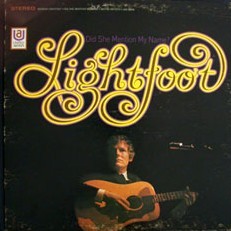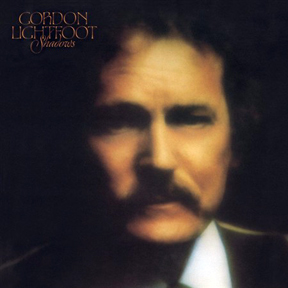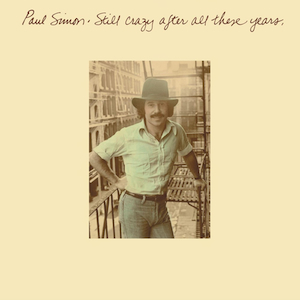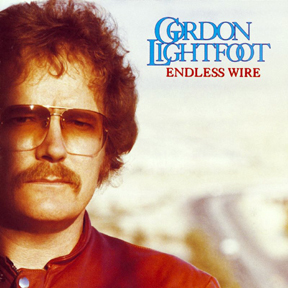
Atlantic Crossing is the sixth solo album by Rod Stewart. Released on 15 August 1975, and recorded in five American studios including Muscle Shoals, Alabama, between April and June 1975, it was produced by Tom Dowd, and peaked at number one in the UK, and number nine on the Billboard Top Pop Albums chart. During 1975 Stewart moved to Los Angeles, switched record labels to Warner Brothers, and ended his association with Ronnie Wood, Ian McLagan and the stable of musicians who had been his core collaborators on his albums for Mercury Records.

Did She Mention My Name? is Canadian singer Gordon Lightfoot's third studio album, released in 1968 on the United Artists label. The album marked Lightfoot's first use of orchestration.

Sit Down Young Stranger is Canadian singer Gordon Lightfoot's sixth original album and his best-selling original album. Shortly after its 1970 release on the Reprise Records label, it was renamed If You Could Read My Mind when the song of that title reached #1 on the RPM Top Singles chart in Canada and #5 on the Billboard Hot 100 in the US. The album itself reached #12 on the Billboard 200 chart. In Canada, the album was on the charts from April 18, 1970, to November 27, 1971. It peaked at #8 on March 13, 1971 after an earlier peak at #12 on June 20, 1970. Its last 24 weeks were spent in the 90s, except for two appearances at #88 and one at #100.

Summer Side of Life is Canadian singer-songwriter Gordon Lightfoot's sixth studio album. It was released in 1971 on the Reprise Records Label. The album marked a departure from the sound Lightfoot had established on Sit Down Young Stranger in its use of drums and electric instrumentation, to which he would later return in the second half of the decade. “Redwood Hill” contains elements of bluegrass music.

Old Dan's Records is Canadian singer Gordon Lightfoot's eighth studio album, released in 1972 on the Reprise Records label. The album reached #1 in Canada on the RPM national album chart on November 5, 1972, and remained there for three weeks. In the U.S., it peaked at #95 on the pop chart.

Shadows is Canadian singer Gordon Lightfoot's fourteenth studio album, released in 1982 on the Warner Bros. Records label. It peaked at #87 on the Billboard charts.

Still Crazy After All These Years is the fourth solo studio album by Paul Simon. Recorded and released in 1975, the album produced four U.S. Top 40 hits: "50 Ways to Leave Your Lover", "Gone at Last", "My Little Town", and the title track. It won two Grammy Awards for Album of the Year and Best Male Pop Vocal Performance in 1976.

Endless Wire is the Canadian singer Gordon Lightfoot's twelfth studio album, released in 1978 on Warner Bros. Records (#3149).

Summertime Dream is Canadian singer Gordon Lightfoot's eleventh studio album, released on the Reprise Records label in 1976. It peaked at #1 on the Canadian RPM national album chart, and #12 on the US Billboard pop chart.

Salute is the fifteenth studio album by Canadian musician Gordon Lightfoot, released in 1983 Warner Brothers Records. It barely registered on the charts (#175) and is one of his least-known recordings. Consequently, songs from the album were rarely featured in Lightfoot's live performances.

Dream Street Rose is Canadian singer Gordon Lightfoot's thirteenth studio album, released in 1980 on the Warner Brothers Records label (#3426). The album peaked at #58 on the country chart and at #60 on the pop chart. It was the last album that would see Lightfoot collaborate with long-time producer Lenny Waronker.

Sundown is Canadian singer Gordon Lightfoot's ninth studio album, released in 1974 on the Reprise Records label. It was the only Lightfoot album to reach No. 1 on the pop chart in the US. In his native Canada, it topped the RPM 100 for five consecutive weeks, first hitting No. 1 on June 22, 1974, the same day it reached the top of the chart south of the border.

Deltics is the second studio album by British singer-songwriter Chris Rea. It was released in 1979 on Magnet Records. The album is named after the East Coast rail network's Deltic-class locomotives that were used in the 1960s and 1970s. The album is Rea's first album to chart on the UK Albums Chart, peaking at number fifty-four. The single "Diamonds" peaked at number 44 on both the UK Singles Chart, and Billboard Hot 100, where it charted for eight weeks. The B-side of this single, "Cleveland Calling", was not included on the CD reissue of the album. The album producer Gus Dudgeon had made several early albums with Elton John.

East of Midnight is Canadian musician Gordon Lightfoot's sixteenth studio album, released in 1986 on the Warner Bros. Records label. The album reached #165 on the Billboard 200.

A Painter Passing Through is the eighteenth studio album by Canadian singer Gordon Lightfoot, released in 1998 on Reprise Records. It was his first album of original music in five years after Waiting for You, which had been his first since 1986's East of Midnight. Well-known record producer Daniel Lanois makes a guest appearance on the album. A Painter Passing Through is a live studio album.

"Sundown" is a song by Canadian folk artist Gordon Lightfoot, from the titular album, released as a single in March 1974.

Chain Lightning is an album by American singer-songwriter Don McLean. It was recorded in Nashville between June and August 1978 and featured many of that city's noted session players as well as backing vocals from the Jordanaires. It was first released in December 1978 in the UK and other markets, but not released for another two years in the US following its delayed success in European markets. The lead single "Crying" became a major hit for McLean, reaching No.1 in the UK Singles Chart in June 1980. The album was subsequently repackaged and released in the US where it also became a success with "Crying" reaching the top five in early 1981. "Since I Don't Have You" was also released as a single, reaching #23.

Back Home Again is the eighth studio album by American singer-songwriter John Denver, released in June 1974.

Aretha is the thirty-first studio album by American singer Aretha Franklin, originally released on October 27, 1986, by Arista Records. It is the third album with the Aretha title to be released by Franklin, following her 1961 album and 1980 album.

"Rainy Day People" is a song written and recorded by Gordon Lightfoot, released on his 1975 album, Cold on the Shoulder, and also as a single. "Rainy Day People" went to number 26 on the Billboard Hot 100. It was Lightfoot's last of four songs to reach number one on the Easy Listening chart, spending one week at number one in May 1975.



















